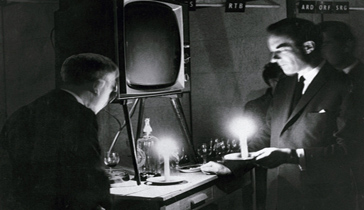CFP: BBC2 at 50 Conference
Published: 1 November 2013BBC2: Origins; Influence; Audiences: A 50th Anniversary Conference
25 April 2014
Science Museum, London
Deadline for submissions: 29 November 2013
On 20 April 1964 the BBC launched its second television channel: BBC2. Although the launch was a flop (due to a major power cut) the station soon became a fixture of UK broadcasting. This conference engages with the example of BBC2 in a contribution to the history of how, as well as what, we access through television.
 In the 1960s questions were raised about the increasingly dominant role of television in the home and the part the Pilkington Committee played in preserving middle- and upper-class values in the medium. It was also the first channel in the UK to offer UHF, then colour, television, changing the way that television was produced, broadcast and consumed.
In the 1960s questions were raised about the increasingly dominant role of television in the home and the part the Pilkington Committee played in preserving middle- and upper-class values in the medium. It was also the first channel in the UK to offer UHF, then colour, television, changing the way that television was produced, broadcast and consumed.
It is also timely in other ways. The way television is accessed is changing rapidly, not only through satellite and cable, but as a result of the convergence of television and internet technologies. Audiences can access services as and when they choose. As the technology changes so must the way we study the history of the television, as not only programme types, but the idea of a self-contained channel becomes a thing of the past.
We are looking for papers that address:
- The origins and early years of BBC2.
- BBC2 and its relationship to the institutional politics of the BBC.
- Wider discussions surrounding the role of television in British society.
- BBC2’s role in the technical history of British broadcasting. For example the advent of UHF and colour television.
- The long history and influence of BBC2: specific programmes, strands and genres.
- Programmes. Did BBC2 really provide a more serious and ‘grown-up’ alternative to BBC1 and ITV? Did this affect the kinds of programmes produced? Who were its competitors? How did its ideas fit with the social and cultural changes of the 1960s?
- More generally, the advent of new channels / multi-channels.
- How and why new channels are established. Can comparisons be made with the establishment of Channel 4 or with ITV, even with the BBC TV service in 1936?
- How has the rise of the internet and ‘on demand’ affected how we consume television?
- Changing viewer experience: historical and current
- Popular Reception of BBC2. By audiences? By other media? How (if at all) have these perceptions changed over the years?
Please send your proposal of around 300 words for a 20 minute paper to research@sciencemuseum.ac.uk by 29 November.
For updates on the conference, visit the website of the Science Museum here.
 Learning on Screen
Learning on Screen